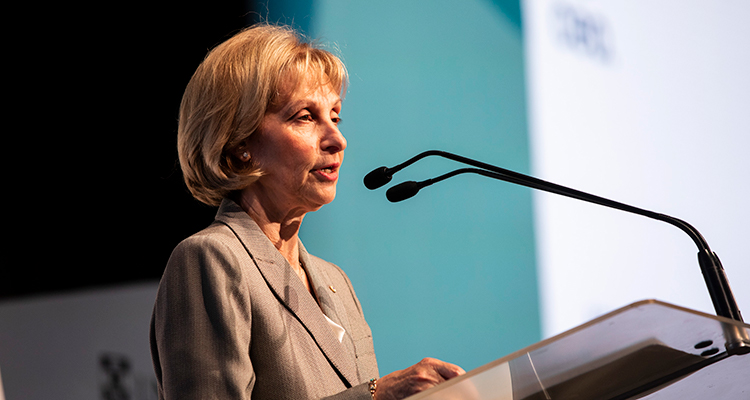
As a student of the fledgling UNSW Law School, Jillian Segal was inspired by the message that the law and its application can shape a better society. Five decades later, she can look back on a successful career that has made a real difference to society and to the many organisations where she has been associated.
The UNSW Law School was just a few years old when Jillian Segal walked through its doors as a student in the 1970s. Starting with just a few hundred students and a handful of now highly respected educators, the new Law School was founded on the belief that the law should serve the needs of the people.
“The faculty was small and intimate, and everybody was committed to those ideas of equality, openness and making the law work for society,” recalls Jillian. “It was a focus on law, lawyers and society - what can we do with the law to make a better society?”
From UNSW, to the law firm Allens, to Harvard, to law reform, through tenures at the Australian Securities and Investments Commission and the Australian Stock Exchange among others, Ms Segal’s professional life has been distinguished by hard work, determination, vision, pragmatism and a passion for a more effective financial system and a stronger relationship between business and social outcomes. During her career she has worked to improve the law and public policy, ultimately contributing to a stronger and more effective governance and social framework. She also made a significant contribution to the uptake of gender diversity recommendations by the ASX Corporate Governance Council, helping to open leadership pathways for women among some of the largest and most powerful corporate entities in the country.
Ms Segal has always sought to promote the number of women in senior management within organisations where she has been associated. She sponsors networking and leadership development amongst senior women at UNSW where she is pleased to see the growth in numbers of female professors and lecturers.
Awarded an Officer of the Order of Australia earlier this year, Jillian Segal AO, now looks back on a career she believes was deeply influenced by the professors and lecturers of the youthful UNSW Law School and its humanistic agenda. She refers to her professional history as “a collection of activities focused on making an impact in society, bringing about positive change.”
Throughout her time as a working lawyer, as a valued contributor to numerous boards in the for profit and not-for-profit space, particularly in education and health, and in her long-time position as Deputy Chancellor on the UNSW Council, Ms Segal has used the tools of her profession to improve governance, encourage innovation and drive ambitious social outcomes.
It’s also an approach she applies to her many philanthropic pursuits, developed in partnership with her husband, John Roth.
One of the couple’s philanthropic relationships is with the Garvan Institute of Medical Research, an organisation they have actively supported for many years. As one of UNSW’s representatives on the Garvan Institute Board, Ms Segal was a significant contributor to the development of the Garvan-Weizmann Centre for Cellular Genomics which is a collaboration between the Garvan Centre of Medical Research in Sydney and the Weizmann Institute of Science in Rehovot, Israel.
“When John and I visited Weizmann a number of years ago I was struck by the similarities in culture and in many areas of endeavour between the Weizmann and Garvan Institutes,” she says. “I always thought that some sort of collaboration would be ideal.”
The Centre was established with the support of the NSW Government in 2017 and is at the forefront of research in single cell genomics. It has the potential to produce transformational improvements in disease diagnosis, individualised treatment options, and targeted therapies. The Centre is now working alongside UNSW and other research centres in the newly minted UNSW Cellular Genomics Futures Institute to accelerate progress in genomics-led research.
The Kirby Institute at UNSW has also been a beneficiary of the couple’s involvement. Dedicated to the prevention and treatment of infectious diseases like HIV and hepatitis, The Kirby Institute has long had to deal with the social context of its work, and the complications of conducting research in support of vulnerable populations affected by discrimination, poverty and disempowerment. Research projects in these communities, particularly projects with an international scope, have proven challenging and have largely been made possible by the contributions of donors such as Ms Segal and Mr Roth, and a handful of others.
The Kirby Institute has powered some significant projects in recent years, including a cervical cancer screening pilot in Papua New Guinea. Designed to address the needs of a population burdened by one of the highest incidences of cervical cancer in the world, the pilot program has delivered results that will lead to better, more cost-efficient and more accurate screening, not just in PNG but in low- and middle-income countries around the globe.
In rural Australia, The Kirby Institute ran a pilot of the Test Treat and Go (TTANGO) program with the aim of reducing the time between testing and treatment for sexually transmitted infections (STIs). The pilot proved extremely beneficial for local primary health services and is now being implemented in remote Indigenous communities across the country.
In her thirteenth year as Deputy Chancellor, and now with a total of ten members of her extended family counted among UNSW alumni, Ms Segal’s relationship with her alma mater is something she greatly values.
“My goal has been to make a positive impact,” she says. “And there are so many things still to do, and so many areas in which to move the dial. Universities are extremely important institutions: they shape one’s outlook on life and hopefully give one the skills to make a positive difference. They are the bedrock on which successful societies are built.“
- Log in to post comments
